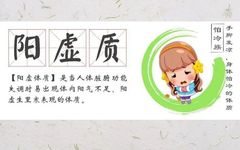Click the blue text
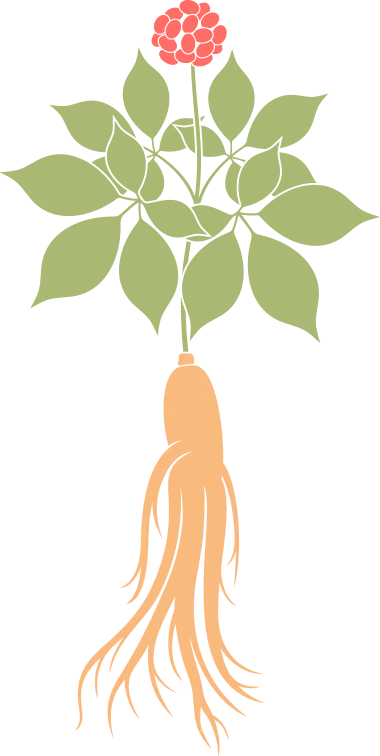
Follow us
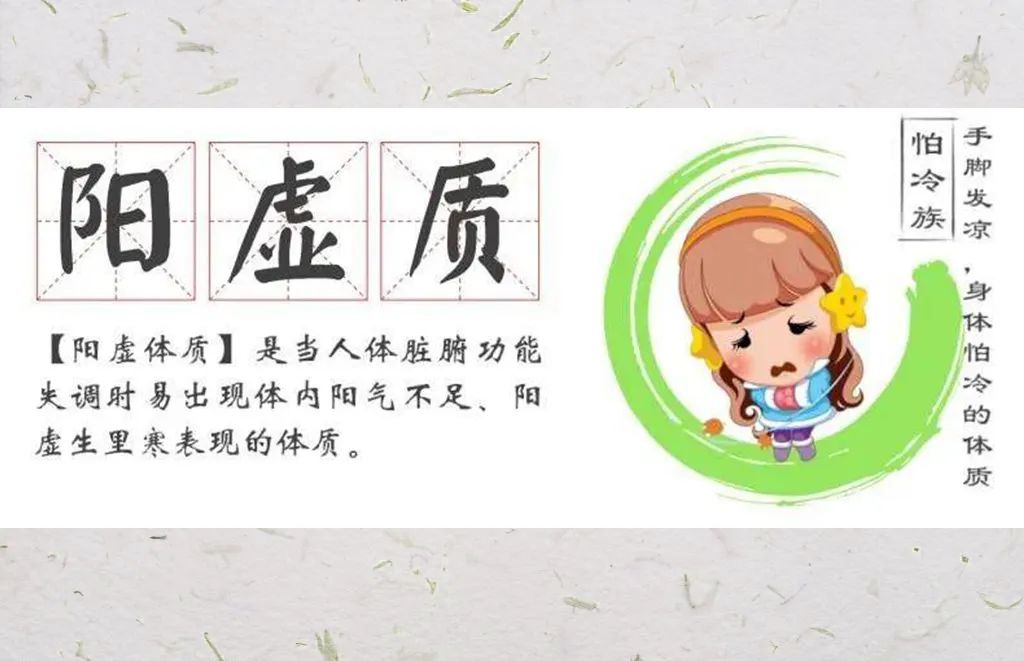
Yang deficiency constitution is characterized by insufficient Yang Qi, leading to a state of constitution marked by cold and deficiency.

【Constitution Characteristics】 The body is often plump or the complexion is pale and dull, generally sensitive to cold and prefers warmth, with fatigue in the limbs, clear and long urination, loose stools, pale lips and a weak pulse. When ill, they are prone to cold symptoms, which may manifest as aversion to cold, curled up posture, cold extremities, or dull abdominal pain, preferring warmth and pressure; or edema, difficulty urinating; or cold pain in the lower back and spine, clear diarrhea; or impotence and infertility; or chest and back pain, cough, and palpitations; or frequent urination at night, urinary incontinence.
【Common Manifestations】 Usually, hands and feet feel cold, the abdomen, lower back, or knees are sensitive to cold, wearing more clothes than others, unable to tolerate cold in winter, and discomfort from air conditioning in summer; prefers quiet and warm food, feels uncomfortable after consuming cold items; prone to loose stools and clear, frequent urination; low energy and excessive sleep.
【Physical Characteristics】 Often plump with weak muscles.
【Environmental Adaptability】 Cannot tolerate cold pathogens; easily affected by dampness.
【Psychological Characteristics】 Generally calm and introverted personality.
【Disease Tendencies】 Prone to cold-related diseases, easily suffers from phlegm, swelling, diarrhea, and impotence.
【Health Preservation Principles】 Tonify Yang and dispel cold, warm and nourish the spleen and kidneys, as the key for those with Yang deficiency is to tonify Yang. Among the five organs, the kidneys are the root of Yang Qi in the body, and the spleen is the source of Yang Qi generation, thus should be emphasized in nourishment.
【Health Preservation Methods】
1. Mental Nourishment: TCM believes that Yang deficiency is a further development of Qi deficiency, thus those with insufficient Yang Qi often exhibit poor emotional states, prone to sadness, hence mental nourishment is essential. One should be adept at regulating emotions, alleviating sadness, preventing fear, and managing anger to eliminate the impact of negative emotions.
2. Environmental Regulation: This constitution often has cold limbs, prefers warmth and fears coolness, tolerates spring and summer but not autumn and winter, thus those with Yang deficiency should pay special attention to environmental regulation to enhance the body’s resistance. It has been noted that if one takes 20-30 sunbaths in summer, each lasting 15-20 minutes, the obtained ultraviolet rays can be utilized for a year.
Living environments should be well-ventilated, with attention to warmth in autumn and winter, and avoiding prolonged stays in air-conditioned rooms in summer. For the elderly and weak individuals, avoid sleeping outdoors in summer, do not let fans blow directly, and do not stay too long in shaded areas. Regularly pay attention to keeping the feet, back, and lower abdomen warm. Prevent excessive sweating, and engage in outdoor activities when the sun is shining. Avoid staying up late, as it harms Yang.
3. Strengthening Physical Exercise: Because “movement generates Yang,” engage in 1-2 sessions of exercise daily throughout the year, with specific activities depending on physical strength. Gentle exercises such as jogging, walking, Tai Chi, or calisthenics are recommended. Avoid excessive strenuous exercise in summer and refrain from exercising in windy, cold, foggy, snowy, or polluted environments in winter.
Self-massage on acupoints such as Qihai (气海), Zusanli (足三里), and Yongquan (涌泉), or regularly moxibustion on Zusanli and Guanyuan (关元). Regularly tapping the Du Mai (督脉) with a peach wood stick (harvested in spring) can invigorate and replenish Yang Qi.
4. Dietary Nourishment: Consume more foods that have a Yang-tonifying effect, such as lamb and chicken. Regularly eat warming and Qi-nourishing foods like scallions, ginger, garlic, Sichuan pepper, leeks, chili, and pepper. Limit consumption of cold and cooling foods such as cucumber, lotus root, pear, and watermelon.
According to the principle of “nourishing Yang in spring and summer,” during the summer solstice, one can consume lamb and Aconite soup once during each of the three hottest days to enhance the body’s Yang.
【Recommended Dietary Therapy】
1. Angelica and Ginger Lamb Soup: 20 grams of Angelica (当归), 30 grams of ginger, washed and soaked in clean water, sliced for later use. 500 grams of lamb, trimmed of sinews, briefly blanched in boiling water to remove blood, then sliced for later use. Place Angelica, ginger, and lamb in a clay pot, add clean water, cooking wine, and salt, bring to a boil over high heat, skim off the foam, then simmer on low heat until the lamb is tender. This recipe is a famous formula from the Han Dynasty by Zhang Zhongjing, warming the center, nourishing blood, dispelling cold, and alleviating pain, particularly suitable for winter consumption.
2. Stir-fried Leeks with Walnuts: 50 grams of walnuts soaked in hot water to remove the skin, drained for later use; 200 grams of leeks, cleaned and cut into sections. Heat sesame oil in a wok until hot, add walnuts and fry until golden, then add leeks and salt, stir-frying until cooked. This dish has the effect of tonifying the kidneys and assisting Yang, warming the lower back and knees, suitable for those with kidney Yang deficiency and cold pain in the lower back and knees.
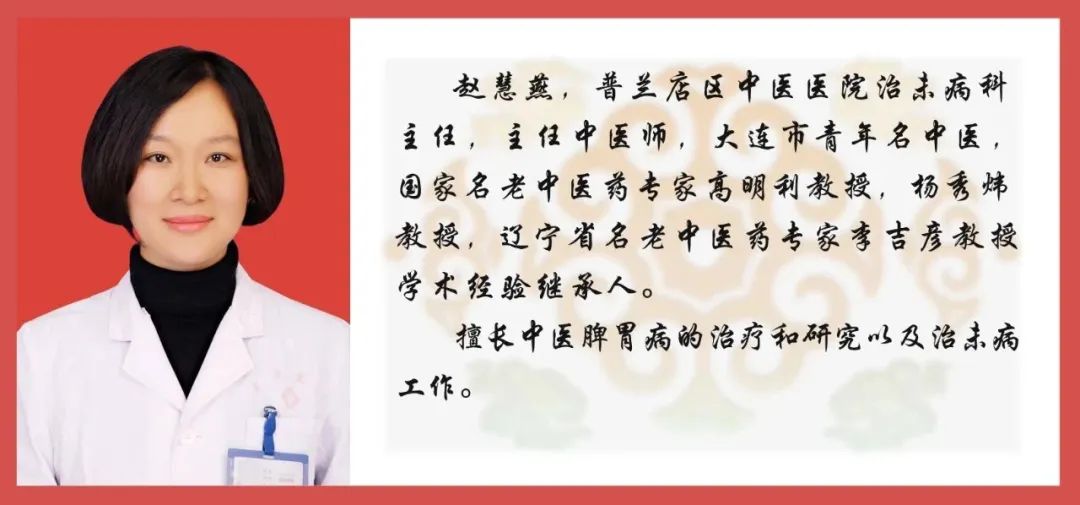
Text collected by: Zhao Huiyan, Department of Preventive Medicine
Image editing by: Xu Simeng
Proofreading by: Wang Naijuan
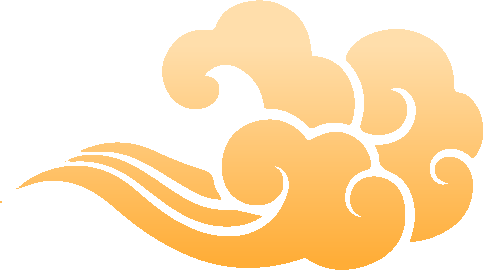


Dalian Pulandian District Traditional Chinese Medicine Hospital
Wishing you health

